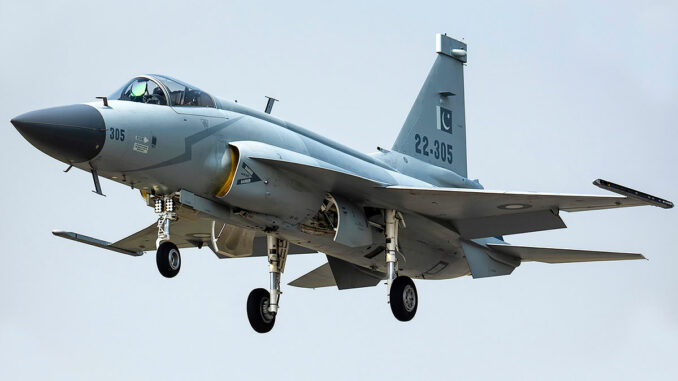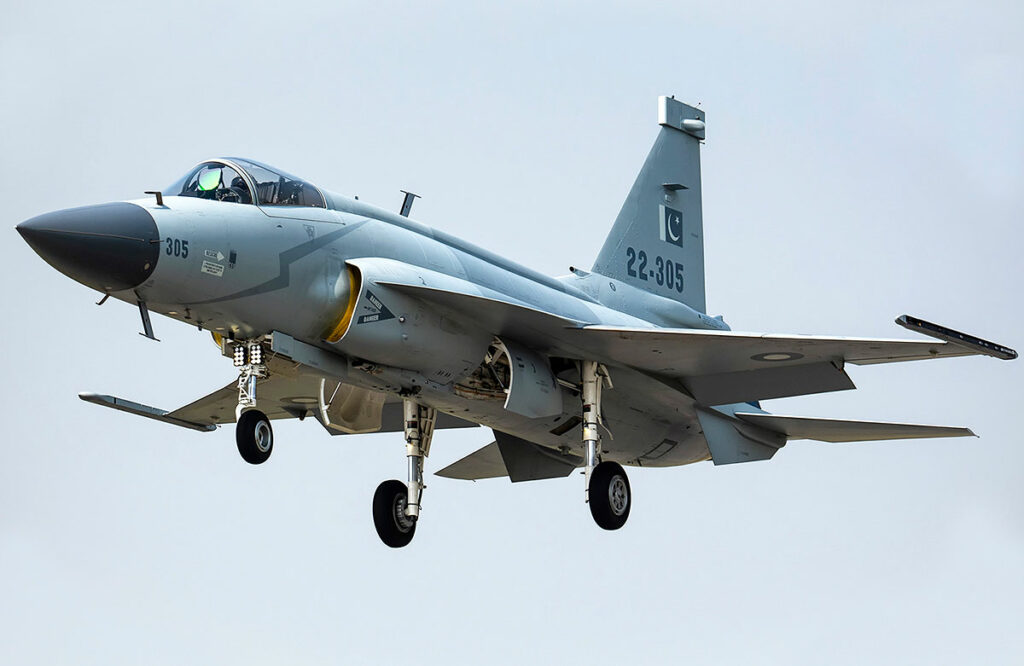
Pakistan has signed a contract with Azerbaijan for the sale of JF-17 Block-III aircraft, strengthening military cooperation between the two countries.
Pakistan has signed an agreement with Azerbaijan for the sale of JF-17 Block-III fighter jets, as part of increased defense cooperation. These 4.5th generation multi-role aircraft, equipped with AESA radars and long-range BVR systems, are designed to boost Azerbaijan’s air power. The JF-17 Block-III, developed in collaboration between China and Pakistan, offers a wide range of combat missions. During an official visit in 2024, Azerbaijani President Ilham Aliyev witnessed demonstrations of the aircraft’s capabilities, consolidating bilateral relations and military cooperation between the two nations.
The sale of the JF-17 Block-III: a strategic reinforcement for Azerbaijan
The signing of the sales agreement between Pakistan and Azerbaijan for JF-17 Block-III fighters marks a turning point in the two countries’ military cooperation. The contract is part of Pakistan’s efforts to strengthen defense ties with friendly nations, while offering advanced military capability to Azerbaijan. The JF-17 Block-III, a 4.5th generation multi-role fighter, is equipped with state-of-the-art technologies, including Active Electronically Scanned Array (AESA) radar and Beyond Visual Range (BVR) missiles, enabling it to carry out a variety of combat missions in complex environments.
Azerbaijan, seeking to modernize and strengthen its air capabilities, has found this aircraft to be an effective solution for enhancing its national defense. The JF-17 is designed to carry out missions such as ground attack, air superiority, reconnaissance and air defense, offering unrivalled operational flexibility. Its in-flight refueling capability, demonstrated by the Pakistan Air Force (PAF) during its participation in ADEX 2024, reinforces its strategic reach and its ability to intervene over long distances.
The agreement with Azerbaijan also includes a training and technical assistance component, ensuring that Azerbaijani pilots and technicians fully master the operation and maintenance of these aircraft. This partnership is part of Pakistan’s wider drive to promote self-sufficiency in the defense field, while consolidating its ties with strategic partners.
The JF-17 Block-III: a 4.5th generation multi-role fighter aircraft
The JF-17 Block-III, the fruit of cooperation between Pakistan and China, represents a significant technological advance for the air forces that use it. It is a 4.5th-generation fighter aircraft, distinguished by its versatility and ability to intervene in a wide range of missions. It is equipped with AESA radar, for more precise, long-range target detection, and greater resistance to electronic interference.
The BVR missile system enables the JF-17 to engage targets beyond visual range, enhancing its air defense capability against multiple threats. This feature is particularly important in a modern defense context, where the ability to detect and neutralize targets at long range is paramount. The JF-17 can carry a payload of 3,600 kg, including laser-guided bombs, air-to-air and air-to-surface missiles and anti-ship weapons, giving it remarkable operational flexibility.
In addition, the integration of electronic warfare systems on the JF-17 enhances its survivability in hostile environments, by disrupting enemy radar systems and protecting the aircraft against guided missiles. With a maximum speed of 1.8 Mach and an operational range of 1,352 kilometers, the JF-17 Block-III is designed to operate in a variety of theaters, from high-intensity aerial combat to precision strikes.

Military cooperation between Pakistan and Azerbaijan
The JF-17 Block-III sale agreement is part of a wider military cooperation between Pakistan and Azerbaijan. For several years, these two nations have sought to strengthen their bilateral ties through joint military exercises, defense agreements and diplomatic initiatives. Azerbaijan’s purchase of the JF-17 marks an important step in the consolidation of this strategic relationship.
Faced with regional security challenges, notably due to tensions in the Caucasus, Azerbaijan has sought to modernize its army and diversify its military partners. Pakistan, as producer of the JF-17 in collaboration with China, has become a supplier of choice for Azerbaijan. This partnership is also motivated by shared geopolitical interests, notably their opposition to Armenia in the Nagorno-Karabakh conflict.
Diplomatic and military relations between Pakistan and Azerbaijan have intensified in recent years, with high-level visits, including President Ilham Aliyev’s recent visit to Pakistan. The latter was able to observe first-hand the capabilities of the JF-17 Block-III during a flight demonstration, thus consolidating his interest in these aircraft. In return, Pakistan benefits from privileged access to Azerbaijani military exercises and increased cooperation in armed forces training.
Strategic implications for Azerbaijani air defense
The acquisition of the JF-17 Block-III by Azerbaijan considerably strengthens its air defense capability. This aircraft, with its great operational flexibility, enables Azerbaijan to improve its response to air threats, while diversifying its arsenal. Unlike more expensive fighter jets such as the F-16, the JF-17 offers a competitive cost-efficiency ratio, while being equipped with the latest technologies required for modern defense missions.
For Azerbaijan, the ability to carry out air superiority and ground attack operations with a modern aircraft is crucial in a context of ongoing regional tensions. The JF-17, with its air-to-air refueling capability, enables the Azerbaijani air force to carry out long-range missions without having to rely on local air bases, thereby increasing its operational reach. This flexibility is essential for ensuring national security and responding effectively to any potential conflict.
In addition, the logistical support provided by Pakistan, particularly in terms of maintenance and training, enables Azerbaijan to maintain a high level of operational readiness. It also reduces the country’s dependence on other international suppliers, strengthening its military autonomy.
War Wings Daily is an independant magazine.